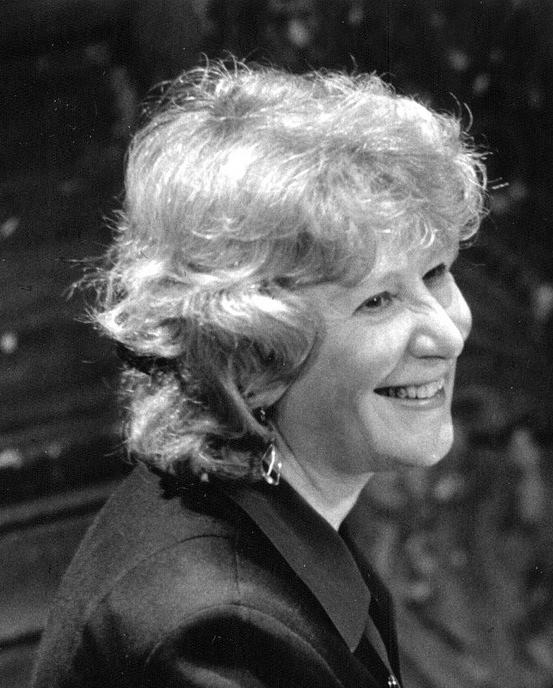Women composers (and performers) reign at Bargemusic

Ursula Oppens performed at the Women Composers concert Wednesday night at Bargemusic.
Many of the composers now making waves in concert halls are women, and that’s quite a change from, say, thirty years ago. But there are those who say that a bit of musical affirmative action is still in order.
Whether for that reason, or just to have a rockin’ girls’ night out, Brooklyn’s Bargemusic is going all female, all the time with a three-concert Labor Day Festival titled “A Celebration of Contemporary Women Composers by Women Performers,” which opened Wednesday night with a program of compositions by seven women, performed by seven women (with just one overlap between the groups, composer-pianist Dalit Warshaw).
Although pianist and longtime new-music exponent Ursula Oppens was the best-known of the performers, all gave committed and effective performances of music in a wide variety of contemporary styles from lushly lyrical to atonally contrapuntal to post-minimalist.
Giving the word “contemporary” fresh meaning, each performance was some kind of a premiere, including no fewer than four worlds, two New Yorks, and one Brooklyn (Paola Prestini’s lyrical The Phoenix for solo violin).
Of course, the unavoidable question was: Does an all-female evening of music actually sound different from a night of mixed doubles or (as still often happens) a whole program of men playing music by men?
Perhaps it’s not entirely dodging the question to note, first, that the feeling in the tiny, 60-seat space—more like a living room than a concert hall–was effervescent. Whatever the mood or merits of the performances, the delight that all involved took in the program was unspoken, but palpable.
Pianist Oppens opened the event with her only performance of the night, an extensive Fantasy for solo piano by Laura Kaminsky (N.Y. premiere) that explored, in episodic fashion, piano sonorities from Debussyesque gongs and watery burbles to jazzy dialogue between the hands.
Kaminsky’s piece, with its moderation of expression and close attention to nuance and detail, often had one imagining an atonal Amy Beach composing “A Hermit Thrush at Eve” in 2017. Oppens’s insight into the score, communicated through a varied tonal palette and keen-eared voicing, was a reminder of why composers from John Adams to Elliott Carter have queued up to write pieces for her.
The “now for something completely different” tone of the evening was set immediately by Yoko Sato’s The Road for solo shamisen (N.Y. premiere), a racy (and not particularly sex-specific) item for the banjo-like Japanese instrument, performed with poise and verve by Yoko Reikano Kimura. With tone ranging from pianissimo drumming on the instrument’s body to harsh snap-twanging, Kimura built up a head of rhythmic steam over a persistent drone note in the bass.
Pianist Kathleen Supove gave an enigmatic yet evocative world-premiere performance of Miya Masaoka’s brief piece The Greenland Fjords, with its graphic score (displayed to the audience during the performance) consisting of a map drawn by the explorer Louise Boyd in 1933. After reaching into the piano from the side to produce moaning wind sounds on its damped strings, Supove went to the keyboard to evoke rolling contours and scintillating summits.
Another world premiere followed, as soprano Nancy Allen Lundy and pianist Warshaw introduced two songs from the latter’s cycle But Not Forgotten, featuring strong and notably female points of view. Lundy’s fine thread of vocal tone proved equal to the fortissimo climax of “Then” (to Muriel Rukeyser’s elegaic yet passionate poem) but was especially affecting in high pianissimo and the song’s ultra-soft closing bars. Lundy then switched effectively to swooping speech-singing for a setting of several sardonic poems by Dorothy Parker.
Rendering the distinctive yet discreet piano accompaniments—which, again Beach-like, incorporated the bird songs that came through the window at the artist colony where she was composing–Warshaw didn’t “play like a composer,” but instead stroked out the warmest tone heard from the Steinway all evening.
Nordic scenery returned in Alexandra du Bois’s piano piece Fjord, which in its world-premiere performance by Supove had some difficulty emerging from the pedal-heavy depths of its opening bars to the relative sunshine of a Mussorgsky-like folk tune in the middle. In a less murky rendition, the piece might not have seemed overlong, as it did Wednesday.
In contrast, Prestini’s brief violin piece The Phoenix left one wishing for more of its distinct brand of robust lyricism seasoned with witty asides. Violinist Jennifer Choi didn’t spare the Romantic sonorities as she spooled out the piece’s long melodic lines and kissed off the Kreislerian staccato and pizzicato passages.
Choi and Supove returned to close the program with the world premiere of a violin-and-piano version of Missy Mazzoli’s A Thousand Tongues (originally for voice, cello, and electronics). Electronic looping supplied the multiplicity of voices implied in the title, and pulsing electronics added an erotic charge as the players shifted from long notes and tremolo to rapid figurations.
The piece’s long crescendo and quiet, enigmatic conclusion suggested both a fathomless capacity for passion and an ability to keep secrets, a paradoxical combination some might call particularly feminine. In any case, it seemed, to one listener at least, just the right note on which to end an evening of women celebrating women.
Bargemusic’s Labor Day Festival, “A Celebration of Contemporary Women Composers by Women Performers” will continue with concerts 8 p.m. Friday and Saturday. The works by Kaminsky, Sato and Warshaw will be repeated on both programs, and the work by du Bois on Friday only. bargemusic.org; 800-838-3006.